初二英语上册语法-练习及讲解
- 格式:doc
- 大小:81.00 KB
- 文档页数:13
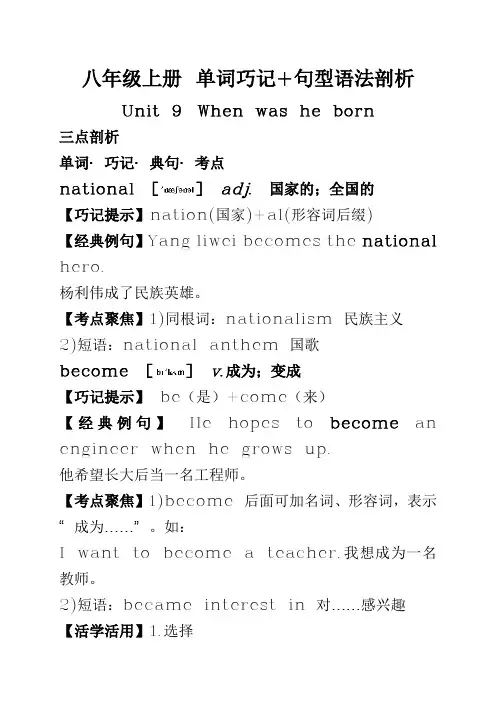
八年级上册单词巧记+句型语法剖析Unit 9When was he born三点剖析单词·巧记·典句·考点national []adj.国家的;全国的【巧记提示】nation(国家)+al(形容词后缀)【经典例句】Yang liwei becomes the national hero.杨利伟成了民族英雄。
【考点聚焦】1)同根词:nationalism 民族主义2)短语:national anthem 国歌become []v.成为;变成【巧记提示】 be(是)+come(来)【经典例句】He hopes to become an engineer when he grows up.他希望长大后当一名工程师。
【考点聚焦】1)become 后面可加名词、形容词,表示“成为……”。
如:I want to become a teacher.我想成为一名教师。
2)短语:became interest in 对……感兴趣【活学活用】1.选择When did she a movie star?A.becameB.becomeC.isD.was答案:Bcall []v.把……叫做;称呼;为……取名【巧记提示】c+all(所有的)【经典例句】You can call me Matthew.你可以叫我马太。
【考点聚焦】1) call后面加双宾语。
2)常见的短语:call at 访问(某地);call for 要求,号召;call on 拜访3)call还有“打电话”的意思。
如:Please call me when you come back.当你返回来的时候,给我打电话。
【活学活用】2.选择This is Tiger Woods,you can Woods.A.call himB.call heC.call for himD.call on him答案:Apiece []n.(艺术品、音乐的)幅;篇;首【经典例句】 What a beautiful piece of music!多好听的一首曲子啊!【考点聚焦】1)a piece of+不可数名词如:a piece of cloth 一块布;a piece of wood 一块木头2)在修饰后面的名词时,常把形容词放在piece的前面。
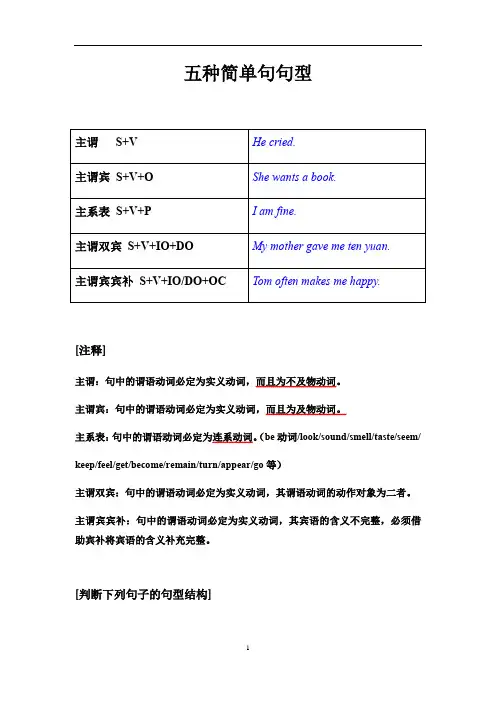
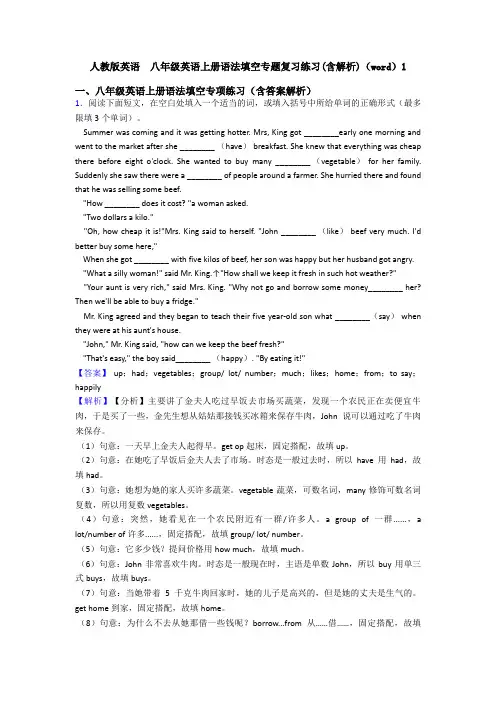
人教版英语八年级英语上册语法填空专题复习练习(含解析)(word)1一、八年级英语上册语法填空专项练习(含答案解析)1.阅读下面短文,在空白处填入一个适当的词,或填入括号中所给单词的正确形式(最多限填3个单词)。
Summer was coming and it was getting hotter. Mrs, King got ________early one morning and went to the market after she ________ (have) breakfast. She knew that everything was cheap there before eight o'clock. She wanted to buy many ________ (vegetable)for her family. Suddenly she saw there were a ________ of people around a farmer. She hurried there and found that he was selling some beef."How ________ does it cost? "a woman asked."Two dollars a kilo.""Oh, how cheap it is!"Mrs. King said to herself. "John ________ (like) beef very much. I'd better buy some here,"When she got ________ with five kilos of beef, her son was happy but her husband got angry. "What a silly woman!" said Mr. King.↑"How shall we keep it fresh in such hot weather?""Your aunt is very rich," said Mrs. King. "Why not go and borrow some money________ her? Then we'll be able to buy a fridge."Mr. King agreed and they began to teach their five year-old son what ________(say) when they were at his aunt's house."John," Mr. King said, "how can we keep the beef fresh?""That's easy," the boy said________ (happy). "By eating it!"【答案】up;had;vegetables;group/ lot/ number;much;likes;home;from;to say;happily【解析】【分析】主要讲了金夫人吃过早饭去市场买蔬菜,发现一个农民正在卖便宜牛肉,于是买了一些,金先生想从姑姑那接钱买冰箱来保存牛肉,John说可以通过吃了牛肉来保存。
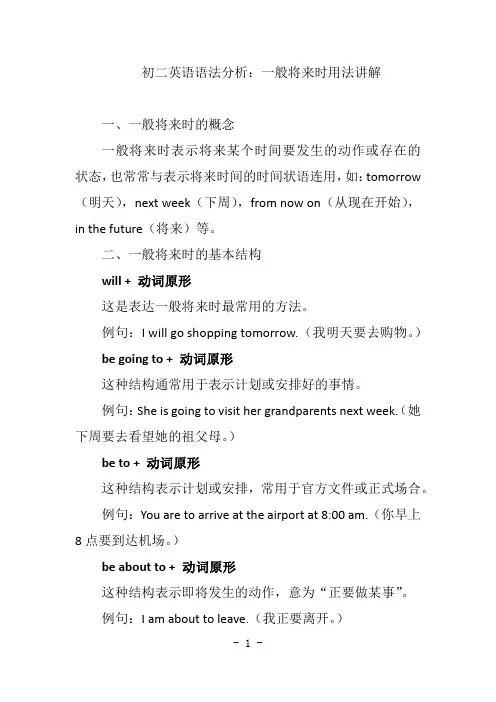
初二英语语法分析:一般将来时用法讲解一、一般将来时的概念一般将来时表示将来某个时间要发生的动作或存在的状态,也常常与表示将来时间的时间状语连用,如:tomorrow (明天),next week(下周),from now on(从现在开始),in the future(将来)等。
二、一般将来时的基本结构will + 动词原形这是表达一般将来时最常用的方法。
例句:I will go shopping tomorrow.(我明天要去购物。
)be going to + 动词原形这种结构通常用于表示计划或安排好的事情。
例句:She is going to visit her grandparents next week.(她下周要去看望她的祖父母。
)be to + 动词原形这种结构表示计划或安排,常用于官方文件或正式场合。
例句:You are to arrive at the airport at 8:00 am.(你早上8点要到达机场。
)be about to + 动词原形这种结构表示即将发生的动作,意为“正要做某事”。
例句:I am about to leave.(我正要离开。
)be due to + 动词原形这种结构表示某事预定或预期将要发生。
例句:The train is due to arrive at 5:00 pm.(火车预定下午5点到达。
)三、一般将来时的用法1表示将来的动作或状态例句:I will buy a new car next year.(明年我要买一辆新车。
)2表示将来的计划或安排例句:We are going to have a picnic this weekend.(我们这个周末要去野餐。
)3表示根据现有情况推测未来的可能性例句:It's going to rain soon.(很快就要下雨了。
)4表示命令、请求、建议等例句:You are to finish your homework before you go out.(你出去之前要把作业做完。
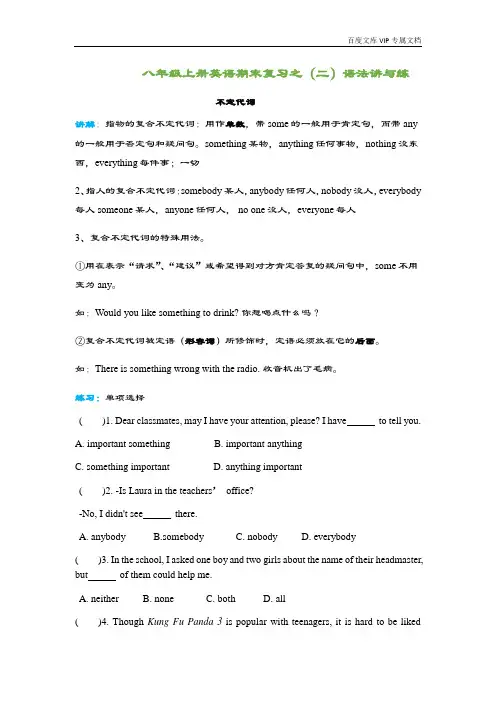
八年级上册英语期末复习之(二)语法讲与练不定代词讲解:指物的复合不定代词:用作单数,带some的一般用于肯定句,而带any 的一般用于否定句和疑问句。
something某物,anything任何事物,nothing没东西,everything每件事;一切2、指人的复合不定代词:somebody某人,anybody任何人,nobody没人,everybody 每人someone某人,anyone任何人, no one没人,everyone每人3、复合不定代词的特殊用法。
①用在表示“请求”、“建议”或希望得到对方肯定答复的疑问句中,some不用变为any。
如:Would you like something to drink? 你想喝点什么吗?②复合不定代词被定语(形容词)所修饰时,定语必须放在它的后面。
如:There is something wrong with the radio. 收音机出了毛病。
练习:单项选择( )1. Dear classmates, may I have your attention, please? I have to tell you.A. important somethingB. important anythingC. something importantD. anything important( )2. -Is Laura in the teachers’office?-No, I didn't see there.A. anybodyB.somebodyC. nobodyD. everybody( )3. In the school, I asked one boy and two girls about the name of their headmaster, but of them could help me.A. neitherB. noneC. bothD. all( )4. Though Kung Fu Panda 3 is popular with teenagers, it is hard to be likedby .A. nobodyB. somebodyC. everybodyD. anybody( )5. Mum always tells me, "A smile costs , but gives much.”A. anythingB. somethingC.everythingD. nothing一般过去时讲解:一、包含be动词的一般过去时的句式1.肯定句句式:主语+was/were+其他.They were at home last Sunday.上周日他们在家里。
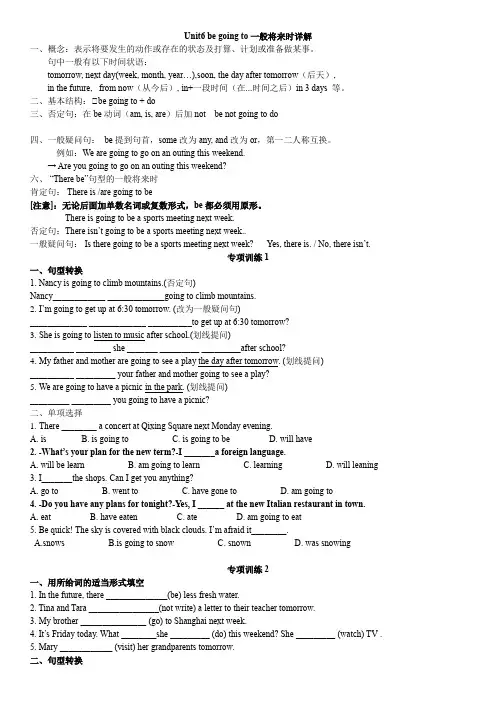
Unit6 be going to一般将来时详解一、概念:表示将要发生的动作或存在的状态及打算、计划或准备做某事。
句中一般有以下时间状语:tomorrow, next day(week, month, year…),soon, the day after tomorrow(后天),in the future, from now(从今后),in+一段时间(在...时间之后)in 3 days 等。
二、基本结构:①be going to + do三、否定句:在be动词(am, is, are)后加not be not going to do四、一般疑问句:be提到句首,some改为any, and改为or,第一二人称互换。
例如:We are going to go on an outing this weekend.→ Are you going to go on an outing this weekend?六、“There be”句型的一般将来时肯定句:There is/are going to be[注意]:无论后面加单数名词或复数形式,be都必须用原形。
There is going to be a sports meeting next week.否定句:There isn’t going to be a sports meeting next week..一般疑问句:Is there going to be a sports meeting next week?Yes,there is./No,there isn’t.专项训练1一、句型转换1. Nancy is going to climb mountains.(否定句)Nancy____________ _____________going to climb mountains.2.I’m going to get up at 6:30 tomorrow. (改为一般疑问句)_____________ _____________ __________to get up at 6:30 tomorrow?3.She is going to listen to music after school.(划线提问)__________ ________ she _______ _________ _________after school?4.My father and mother are going to see a play the day after tomorrow. (划线提问)__________ _________ your father and mother going to see a play?5.We are going to have a picnic in the park. (划线提问)_________ _________ you going to have a picnic?二、单项选择1.There ________ a concert at Qixing Square next Monday evening.A. isB. is going toC. is going to beD. will have2. -What’s your plan for the new term?-I _______a foreign language.A. will be learnB. am going to learnC. learningD. will leaning3. I_______the shops. Can I get you anything?A. go toB. went toC. have gone toD. am going to4. -Do you have any plans for tonight?-Yes, I ______ at the new Italian restaurant in town.A. eatB. have eatenC. ateD. am going to eat5. Be quick! The sky is covered with black clouds. I’m afraid it________.A.snowsB.is going to snowC. snownD. was snowing专项训练2一、用所给词的适当形式填空1. In the future, there ______________(be) less fresh water.2. Tina and Tara ________________(not write) a letter to their teacher tomorrow.3. My brother _______________ (go) to Shanghai next week.4. It’s Friday today. What ________she _________ (do) this weekend? She _________ (watch) TV .5. Mary ____________ (visit) her grandparents tomorrow.二、句型转换1.Ken is going to keep on writing stories. (否定句、一般疑问句、提问)Ken _________ _________ going to keep on writing stories._________ Ken ___________ to keep on writing stories?__________ _________ Ken going to ____________?三、单项选择( ) 1. Ann____mountains tomorrow morning. A. is going to climb B.climb C.climbs D.is climbing ( ) 2. The girl ______ a new computer for herself next year.A. buyB. buysC. boughtD. is going to buy( ) 3. ---_______ on Sunday? ---She is going to take guitar lessons.A. What does she doB. When is she going to take guitar lessonsC. How is she going to doD. What is she going to do( ) 4. My brother is going to _______ an engineer when he ________ up.A. do; growB. do; growsC. be; growD. be; grows( )5. My brother is going to _______ a cook when he _______ up.A. do; growB. do; growsC. be; growD. be; grows( ) 6. What _____ you _____ to do when you _____ high school?A. do; want; finishB. will; want; finishC. are; going; are going to finishD. are; want; are going to finish( ) 7.The day after tomorrow they ________ a volleyball match.A. will watchingB. watchesC. is watchingD. is going to watch()8. There's going to____in tomorrow's newspapers.A.have something newB.have new somethingC.be something newD.be new something。
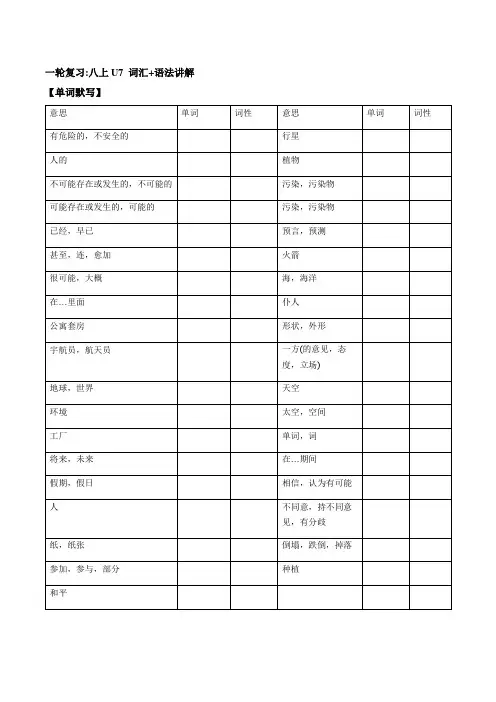
一轮复习:八上U7 词汇+语法讲解【单词默写】【单词变形】【单词变性】dangerous形容词变名词_________________ possible形容词变副词_________________ probably副词变形容词_________________ peace名词变形容词_________________ pollute动词变名词_________________ prediction名词变动词_________________believe动词变名词_________________disagree动词变名词_________________【一词多义】1. even _____________ _____________ ____________Mary works even harder than before.Even if you fail, work hard and you will still succeed one day.Mother worries me a lot, she said, “the things around you are too dangerous, even a small piece of paper can hurt you.”2. earth ___________ ____________We have only one earth. We should protect it well.What on earth is that?3. paper ____________ ____________You can write what you want to say on a piece of paper.Time’s up. Hand in your papers please.4. fall ___________ _____________“Fall” has the same meaning as “autumn”.Kids can fall down from bikes easily when first learning how to ride it.5. plant ___________ _____________We will plant many trees on Trees Planting Day.Plants need watering often.6. space _____________ ______________I‘d like to fly to space one day.There is some space for us to put the piano.【词汇用法】1. already: adv./用于现在完成时/用于肯定句中相关词辨析: already vs. yetalready: adv./用于现在完成时/用于肯定句中yet: adv./用于现在完成时/用于否定句2. during: prep./during +时间段/during the past few years(现在完成时)相关词辨析: during vs. for vs. induring: prep./during the past few years(现在完成时)for: prep./for +一段时间(用延续性动词,通常用一般过去时,现在完成时) in: prep./in +一段时间(固定搭配或一般将来时)3. believe: v./belive sb./believe in sb./believe it or not相关词辨析: trust vs. believetrust: v./trust sb.believe: v./believe sb./believe in sb.【高频短语】in future___________ in the future___________ on holiday___________ take part in___________ out of shape___________ in shape___________ on either side of the road___________in space___________ little space___________ have a word with sb. ___________have words with sb. ___________ in a word___________ in other words___________ believe in___________ believe it or not___________ fall off___________ fall over___________ fall down___________ fall in love with___________ fall asleep___________【攻占语法】情态动词(will)一、will的问答:1) —Will you come to my party?—Yes, I will./No, I won’t.二、will 的用法:1. 用于一般将来时2. 表示现在的习惯, 当表示过去的习惯时用wouldHe will often read English books all night.He would always have bread for breakfast in his childhood.3. 表示强烈的意愿: 常用于口语中重读I will succeed.【词汇练习】1.Yang Liwei is a great Chinese a ________.2.It is our duty to protect the living e ________ in the earth.3.I have a ________ finished my homework, so I can play computers games.4.Nowadays most people in the city live in a________.5.There are about twenty f ________ along the river. The polluted water from them has destroyed the environment.6. B ________ it or not, last Sunday is the coldest day in the pastyears.7.Children shouldn't run or jump on the busy streets. It is too d ________.8.To save the animals in d________, we shouldn’t cut down the trees any more.9.I agreed to have a picnic in the park on Sunday, but Lily d ________.10.His works was never published(出版) d ________ his lifetime.11.The prices of fruit usually run up d ________ the winter months.12.September had come and leaves were starting to f_________.13.Michelle has f ________asleep with her head against his shoulder.14.What will the cities in the f ________ look like?15.During the summer h ________, I will take part in a two-week work experience activity.16.H ________ can think and talk, but animals can’t.17.It’s i ________ for him to get there on foot because it’s far away.18.If buildings fall down with people i ________, fire fighters come to save the people under the building.19.Could you pass me some pieces of p________ to write on?20.We students should take an active p ________ in more outdoor activities every day.21.Will there be world p________ with only one world in 100 years?22.The earth, our home, is the third p ________ from the sun.23.There are many young people p________ the trees in the park.24.The air is p ________ by factory smoke and we should take action to have more blue days.25.In the future, there will be more fresh water because there will be less p ________ in the sea.26.The e-book readers make it p________ for students to throw away heavy school bags.27.Of all songs he wrote, I think this is p ________ the best one.28.The clouds in the sky are in different s________, such as dogs, rabbits and so on.29.Lots of buildings are standing on both s________ of the road.30.Yang Liwei was the first Chinese astronaut in s ________.【参考答案】dangerous形容词变名词dangerpossible形容词变副词possiblyprobably副词变形容词probablepeace名词变形容词peacefulpollute动词变名词pollutionprediction名词变动词predictbelieve动词变名词beliefdisagree动词变名词disagreement1. even 更即使甚至Mary works even harder than before.Even if you fail, work hard and you will still succeed one day.Mother worries me a lot, she said, “the things around you are too dangerous, even a small piece of paper can hurt you.”2. earth 地球到底We have only one earth. We should protect it well.What on earth is that?3. paper 纸试卷You can write what you want to say on a piece of paper.Time’s up. Hand in your papers please.4. fall 秋天摔跤“Fall” has the same meaning as “autumn”.Kids can fall down from bikes easily when first learning how to ride it.5. plant 种植植物We will plant many trees on Trees Planting Day.Plants need watering often.6. space 太空空间I‘d like to fly to space one day.There is some space for us to put the piano.【高频短语】in future在未来in the future在不久的将来on holiday在度假take part in参与,参加out of shape变形in shape没变形on either side of the road路的两边in space在太空中little space很少的空间have a word with sb. 与某人交流have words with sb. 与某人吵架in a word总而言之in other words换句话说believe in信仰believe it or not信不信由你fall off从…上摔下来fall over摔倒fall down从…上摔下来fall in love with爱上fall asleep入睡【词语练习】Astronaut environment already apartments factories Believe dangerous danger disagree during during fall fallen fall holiday humans impossible inside paper part peace planet planting polluted pollution possible probably shapes sides space。
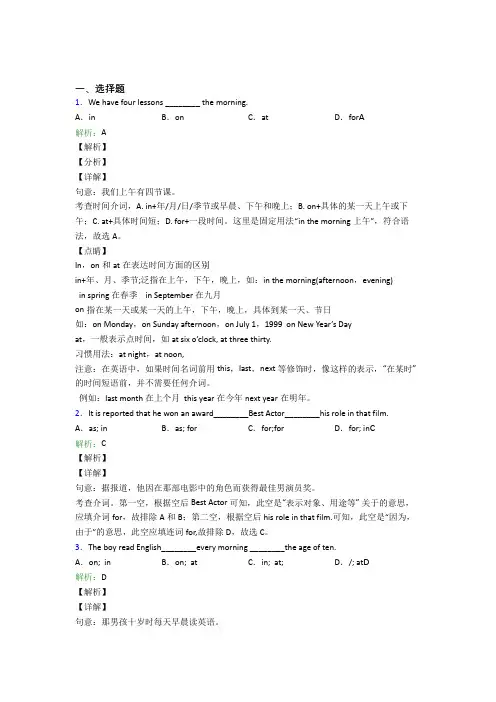
一、选择题1.We have four lessons ________ the morning.A.in B.on C.at D.for A解析:A【解析】【分析】【详解】句意:我们上午有四节课。
考查时间介词,A. in+年/月/日/季节或早晨、下午和晚上;B. on+具体的某一天上午或下午;C. at+具体时间短;D. for+一段时间。
这里是固定用法“in the morning上午”,符合语法,故选A。
【点睛】In,on和at在表达时间方面的区别in+年、月、季节;泛指在上午,下午,晚上,如:in the morning(afternoon,evening)in spring 在春季 in September 在九月on指在某一天或某一天的上午,下午,晚上,具体到某一天、节日如:on Monday,on Sunday afternoon,on July 1,1999 on New Year’s Dayat,一般表示点时间,如at six o’clock, at three thirty.习惯用法:at night,at noon,注意:在英语中,如果时间名词前用this,last,next 等修饰时,像这样的表示,“在某时”的时间短语前,并不需要任何介词。
例如:last month 在上个月 this year在今年 next year在明年。
2.It is reported that he won an award________Best Actor________his role in that film. A.as; in B.as; for C.for;for D.for; in C解析:C【解析】【详解】句意:据报道,他因在那部电影中的角色而获得最佳男演员奖。
考查介词。
第一空,根据空后Best Actor可知,此空是“表示对象、用途等” 关于的意思,应填介词for,故排除A和B;第二空,根据空后his role in that film.可知,此空是“因为,由于”的意思,此空应填连词for,故排除D,故选C。
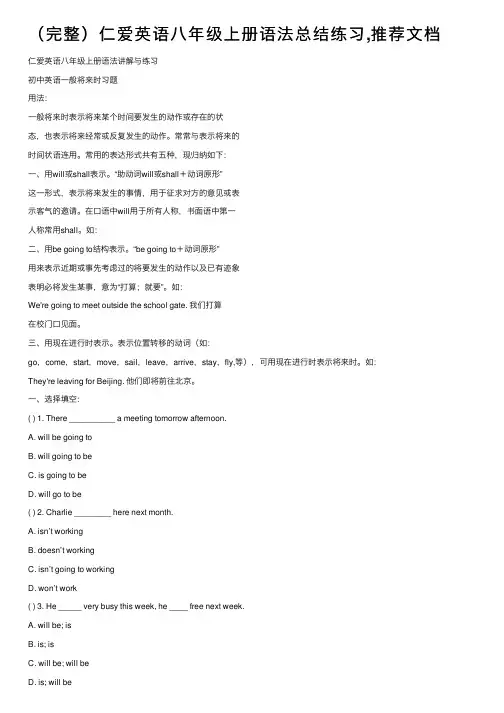
(完整)仁爱英语⼋年级上册语法总结练习,推荐⽂档仁爱英语⼋年级上册语法讲解与练习初中英语⼀般将来时习题⽤法:⼀般将来时表⽰将来某个时间要发⽣的动作或存在的状态,也表⽰将来经常或反复发⽣的动作。
常常与表⽰将来的时间状语连⽤。
常⽤的表达形式共有五种,现归纳如下:⼀、⽤will或shall表⽰。
“助动词will或shall+动词原形”这⼀形式,表⽰将来发⽣的事情,⽤于征求对⽅的意见或表⽰客⽓的邀请。
在⼝语中will⽤于所有⼈称,书⾯语中第⼀⼈称常⽤shall。
如:⼆、⽤be going to结构表⽰。
“be going to+动词原形”⽤来表⽰近期或事先考虑过的将要发⽣的动作以及已有迹象表明必将发⽣某事,意为“打算;就要”。
如:We're going to meet outside the school gate. 我们打算在校门⼝见⾯。
三、⽤现在进⾏时表⽰。
表⽰位置转移的动词(如:go,come,start,move,sail,leave,arrive,stay,fly,等),可⽤现在进⾏时表⽰将来时。
如:They're leaving for Beijing. 他们即将前往北京。
⼀、选择填空:( ) 1. There __________ a meeting tomorrow afternoon.A. will be going toB. will going to beC. is going to beD. will go to be( ) 2. Charlie ________ here next month.A. isn’t workingB. doesn’t workingC. isn’t going to workingD. won’t work( ) 3. He _____ very busy this week, he ____ free next week.A. will be; isB. is; is( ) 4. There _______ a dolphin show in the zoo tomorrow evening.A. wasB. is going to haveC. will haveD. is going to be( ) 5. –________ you ________ free tomorrow?– No. I ________ free the day after tomorrow.A. Are; going to; willB. Are; going to be; willC. Are; going to; will beD. Are; going to be; willbe( ) 6. Mother ________ me a nice present on my next birthday.A. will givesB. will giveC. givesD. give ( ) 7. – Shall I buy a cup of tea for you?–________. (不,不要。
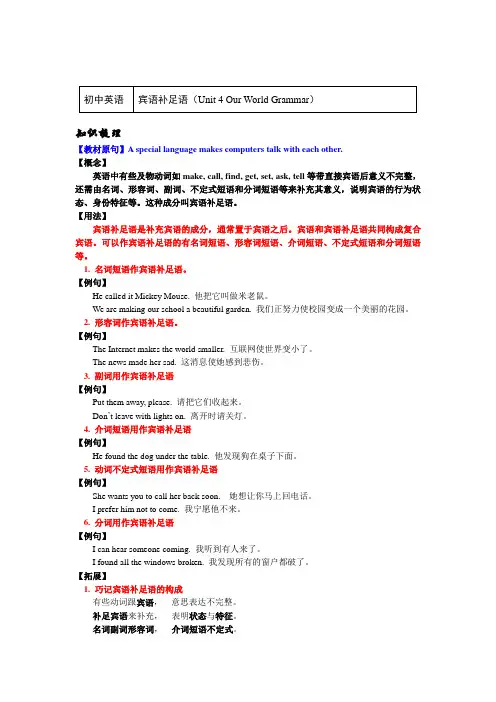
知识梳理【教材原句】A special language makes computers talk with each other.【概念】英语中有些及物动词如make, call, find, get, set, ask, tell等带直接宾语后意义不完整,还需由名词、形容词、副词、不定式短语和分词短语等来补充其意义,说明宾语的行为状态、身份特征等。
这种成分叫宾语补足语。
【用法】宾语补足语是补充宾语的成分,通常置于宾语之后。
宾语和宾语补足语共同构成复合宾语。
可以作宾语补足语的有名词短语、形容词短语、介词短语、不定式短语和分词短语等。
1. 名词短语作宾语补足语。
【例句】He called it Mickey Mouse. 他把它叫做米老鼠。
We are making our school a beautiful garden. 我们正努力使校园变成一个美丽的花园。
2. 形容词作宾语补足语。
【例句】The Internet makes the world smaller. 互联网使世界变小了。
The news made her sad. 这消息使她感到悲伤。
3. 副词用作宾语补足语【例句】Put them away, please. 请把它们收起来。
Don’t leave with lights on. 离开时请关灯。
4. 介词短语用作宾语补足语【例句】He found the dog under the table. 他发现狗在桌子下面。
5. 动词不定式短语用作宾语补足语【例句】She wants you to call her back soon. 她想让你马上回电话。
I prefer him not to come. 我宁愿他不来。
6. 分词用作宾语补足语【例句】I can hear someone coming. 我听到有人来了。
I found all the windows broken. 我发现所有的窗户都破了。
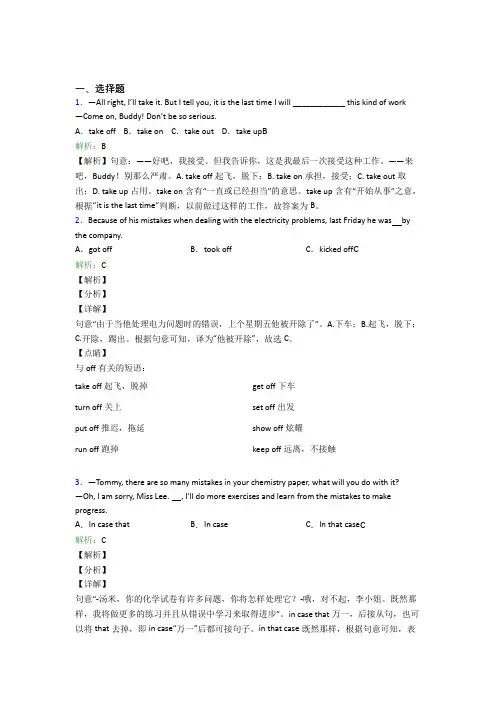
一、选择题1.—All right, I’ll take it. But I tell you, it is the last time I will ____________ this kind of work —Come on, Buddy! Don’t be so serious.A.take off B.take on C.take out D.take up B解析:B【解析】句意:——好吧,我接受。
但我告诉你,这是我最后一次接受这种工作。
——来吧,Buddy!别那么严肃。
A. take off起飞,脱下;B. take on承担,接受;C. take out取出;D. take up占用。
take on含有“一直或已经担当”的意思。
take up含有“开始从事”之意,根据“it is the last time”判断,以前做过这样的工作,故答案为B。
2.Because of his mistakes when dealing with the electricity problems, last Friday he was by the company.A.got off B.took off C.kicked off C解析:C【解析】【分析】【详解】句意“由于当他处理电力问题时的错误,上个星期五他被开除了”。
A.下车;B.起飞,脱下;C.开除,踢出。
根据句意可知,译为“他被开除”,故选C。
【点睛】与off有关的短语:take off起飞,脱掉get off下车turn off关上set off出发put off推迟,拖延show off炫耀run off跑掉keep off远离,不接触3.—Tommy, there are so many mistakes in your chemistry paper, what will you do with it?—Oh, I am sorry, Miss Lee. , I'll do more exercises and learn from the mistakes to make progress.A.In case that B.In case C.In that case C解析:C【解析】【分析】【详解】句意“-汤米,你的化学试卷有许多问题,你将怎样处理它?-哦,对不起,李小姐。
一轮复习:八上U4 词汇+语法讲解【单词默写】【单词变形】【单词变性】comfortable形容词变副词__________________ creative形容词变动词__________________ beautifully副词变形容词__________________ carefully副词变形容词__________________ cheaply副词变形容词__________________ seriously副词变形容词__________________ act动词变名词__________________ magician名词变名词__________________ performer名词变动词__________________ reporter名词变动词__________________ service名词变动词__________________ winner名词变动词__________________ choose动词变名词__________________【一词多义】1. close ___________ ___________ _______________Lucy, don't forget to close the door before you leave the room.We are close friends.His home is close to mine.2. seriously __________ _________He is seriously hurt by the car.Don’t take TV programmes too seriously.3. example __________ ___________For example, he is always the last to leave the classroom.My parents set good examples for me.4. seat ____________ ____________When booking the tickets, we always want to choose the best seats.I was seated as soon as I walked into the classroom.【词汇用法】1. seat: vt./seat sb./seat oneselfn./a good seat/a bad seat近义词辨析: sit vs. seatsit: vi./sit in a chair/sit downseat: vt./seat sb./seat oneselfn./a good seat/a bad seat2. give: v./give sb. sth./give sth. to sb./give sb. a lift/give sb. a ride give的短语:give up_________________ give in_________________ give away_________________give off_________________ give out_________________【高频短语】be close to____________ close friends____________ be crowded with____________ takes sth. seriously____________ play a role in____________ win the prize____________ good service____________ a good seat____________ seat oneself____________ for example____________set an example for sb. ____________the ticket to a football game____________be talented in____________ choose A from B____________ give up____________ give in____________ give off____________ give out____________ give away____________【攻占语法】形容词副词(最高级)一、形容词副词最高级的基本形式: ________________ ________________二、形容词副词最高级的变化规则:三、形容词副词最高级的句型:1. one of +最高级2. which is +最高级of three 以上3. the+序数词+最高级4. 最高级+n.+从句修饰四、形容词副词比较级与最高级的关系1. 同义句转换:I have never seen a more interesting movie.This is the most interesting movie I have ever seen.2. the 的用处:Who is the tallest of the three?Who is the taller of the two?【词汇练习】1.Our teacher took Hellen as a good e ________ to tell the children one shouldn’t lose courage even though he’sdisabled.2.Wu Jing played a main role in the new movie Wolf Warriors 2(战狼2). He a ________ so well that most peopleloved him and the movie became very successful.3.I think Vera can play the piano the best and sing the most b ________ in my class.4.The more c________ we do the homework, the fewer mistakes we will make.5.There are too many books in the store. I don't know which one to c_______.6.Only a few children in my school were c ________ to take part in the singing competition.7.My house is near school, but his is c ________, it only takes him five minutes to walk there.8.China Film Cinema is the best cinema in Beijing. One of the main reasons is that it has the most c ________seats and the biggest screens.9.Tim is so c ________ an artist that he starts a new painting style.10.The train was quite c ________ because there were too many people.11.The air is much f ________ this morning than yesterday morning. Let's go for a walk.12.Are you used to g ________ away your old clothes to the poor children?13.David Copperfield and Liu Qian are two of the most famous m ________ in the world.14.You’ d better not eat between m________, or it will make you fat.15.He can’t buy that expensive piano because his family is very p ________.16.Please show me the m ________. I’d like to order some food.17.Which girl is p ________, the one with long hair or the one with short hair?18.James must be a great player because you can find many p ________ on his shelf.19.When people watch the show, they usually play a r________ in deciding the winner.20.The TV sets in our classroom don’t have big s _________.21.Don’t take what he said s ________ because he always plays jokes on others.22.The food is good in the restaurant, but the s _________ is bad.23.They sang several popular s ________ in the party.24.Many students want to show their t ________ in the school show.25.Most of the movie t ________ are crowded on weekends.26.I have two t________ for the new movie. Let's go to the movies together.27.The w ________ of the singing competition comes from our school28.I had a bad cold and I took some medicine this morning. But now I am feeling even w ________.29.Movie City has the w ________ service, but it has the most comfortable seats.30.If you don't take these talent shows too s ________, they are still fun to watch.【语法练习】1.Jeff believes education is the _______________ (good) way to protect rainforests.2.Malala Yousafzai, 19, is a Pakistani youth activist. She is the _______________(young) person in the worldever to be named United Nations (U.N.) Messenger(信使) of Peace.3.Now Nick is one of _______________(popular) speakers in the world. And his spirit has moved lots of youngpeople.4.Now, years later, this river is one of ________(outstanding) examples of environmental cleanup.5.In 2018 we also lost some of the top minds of human beings, including Chinese writer Louis Cha Leung-yung,________(well) known by his pen name Jin Yong. He created a lot of famous kung fu characters and fictions.6.Three men did most of the ________(important) work on dictionaries: Samuel Johnson, Noah Webster, andJames Murray.7.Today let’s talk about Chinese styles of crossing streets. It has been one of ________(hot) topics on the Internetrecently.8.I want you to make sure that before you leave school, you have realized your dream to be one of_____________(fast) runners of the school.9. A group of students at Shenzhen high school did a survey in August to find out the answers through interviewsand an online questionnaire, they found _______________(big) problem of all was that many bicycles were broken by the rain and the sun.10.The world’s ________(high) mountain is in need of cleaning. A team of volunteers flew to Mount Everest somedays ago to clean up tons of trash on the mountain by its climbers.11.I sometimes scan the local news headlines at my favorite news Website and read up the _____________(late)local and international news.12. A Frenchman had arrived at a small Italian town and was staying with his wife at ________(famous) hotel there.One night he went out for a walk alone.13.We have been happily married for thirty-five years. But I have to say that my husband’s transition(过渡) toretirement was one of _____________(big) challenges in our life.14.The Wandering Earth has made over 4.3 billion yuan since its opening on Feb 5th, the first day of the LunarNew Year holiday, making it the second _______________(high) grossing film China’s box office records.15.The survey found that 83.8 percent of Chinese children want to be friends with their parents, ________(great)number among the four countries.【参考答案】comfortable形容词变副词comfortably creative形容词变动词create beautifully副词变形容词beautiful carefully副词变形容词careful cheaply副词变形容词cheapseriously副词变形容词seriousact动词变名词actionmagician名词变名词magicperformer名词变动词performreporter名词变动词reportservice名词变动词servewinner名词变动词winchoose动词变名词choice1. close 关上亲密的靠近的Lucy, don't forget to close the door before you leave the room.We are close friends.His home is close to mine.2. seriously 严重地认真地He is seriously hurt by the car.Don’t take TV programmes too seriously.3. example 例子榜样For example, he is always the last to leave the classroom.My parents set good examples for me.4. seat 座位使…坐下When booking the tickets, we always want to choose the best seats.I was seated as soon as I walked into the classroom.【高频短语】be close to靠近,接近close friends亲密的朋友be crowded with拥挤takes sth. seriously把…当真play a role in参与,参加win the prize赢得奖品good service好的服务a good seat好的位置seat oneself坐下for example举例set an example for sb. 为…做榜样the ticket to a football game足球赛的门票be talented in在…有天赋choose A from B从B里挑出A give up放弃give in屈服give off释放give out分发give away赠送一、形容词副词最高级的基本形式: adj./adv.+est most +adj./adv.二、形容词副词最高级的变化规则:【词语练习】Example acted beautifully carefully choose chosen closer comfortable creative crowded fresher giving magicians meals poor menu prettier prizes role screens seriously service songs talent theater tickets winner worse worst seriously【语法练习】Best youngest the most popular the most outstanding best most important hottest the fastest the biggest highest latest the most famous the biggest highest the greatest。
英语八年级英语上册语法填空20(附带答案解析)经典一、八年级英语上册语法填空专项练习(含答案解析)1.阅读下面短文,在空白处填入一个适当的词,或填入括号中所给单词的正确形式(最多限填3个单词)。
Marie Kondo is good at organizing(整理). Although she is not a popular star or a young actress, she. ________ (become) very famous in the world. She has written some________ on organizing. In her books, Marie says that if you hope to spend________ (little)time on housework, you should make things right ________ first. She tells people not to keep things by season. She also thinks we can do housework ________ (cheap)without spending a lot of money. For example, she asks people not to ________ money on expensive organizing boxes.She was ________ (interest) in organizing when she was young. As a little girl, ________ of her hobbies was to read books about organizing. In school, she cleaned up bookshelves while her classmates were having a, ________(wonder) time in P. E. classes.Some people don't think her ideas ________ right. However, she has a large number of fans. She has made many speeches on TV. And someone made a movie about her life stories. And she is very famous now.【答案】 becomes;books;less;at;cheaply;spend;interested;one;wonderful;are 【解析】【分析】主要讲了Marie Kondo擅长整理。
八年级上册单词巧记+句型语法剖析Unit 9When was he born三点剖析单词·巧记·典句·考点national []adj.国家的;全国的【巧记提示】nation(国家)+al(形容词后缀)【经典例句】Yang liwei becomes the national hero.杨利伟成了民族英雄。
【考点聚焦】1)同根词:nationalism 民族主义2)短语:national anthem 国歌become []v.成为;变成【巧记提示】be(是)+come(来)【经典例句】He hopes to become an engineer when he grows up.他希望长大后当一名工程师。
【考点聚焦】1)become 后面可加名词、形容词,表示“成为……”。
如:I want to become a teacher.我想成为一名教师。
2)短语:became interest in 对……感兴趣【活学活用】1.选择When did she a movie star?A.becameB.becomeC.isD.was答案:Bcall []v.把……叫做;称呼;为……取名【巧记提示】c+all(所有的)【经典例句】You can call me Matthew.你可以叫我马太。
【考点聚焦】1) call后面加双宾语。
2)常见的短语:call at 访问(某地);call for 要求,号召;call on 拜访3)call还有“打电话”的意思。
如:Please call me when you come back.当你返回来的时候,给我打电话。
【活学活用】2.选择This is Tiger Woods,you can Woods.A.call himB.call heC.call for himD.call on him答案:Apiece []n.(艺术品、音乐的)幅;篇;首【经典例句】What a beautiful piece of music!多好听的一首曲子啊!【考点聚焦】1)a piece of+不可数名词如:a piece of cloth 一块布;a piece of wood 一块木头2)在修饰后面的名词时,常把形容词放在piece的前面。
初中英语语法讲解(形容词、副词的比较等级)知识梳理:形容词、副词的比较等级【教材原句】Does Tara work as hard as Tina? 塔拉工作和蒂娜一样努力吗?Is Tom smarter than Sam? 汤姆比萨姆聪明吗?It’s the closest to home. And you can buy tickets the most quickly there.它离家最近。
并且你可以在那儿最快地买到票。
【概念】形容词和副词有三级,原级、比较级和最高级。
★形容词和副词的原级,即形容词和副词的原形,可用very, so, quite, too, rather等修饰。
还用于句型as…as… (和……一样……),以及 not so/as…as…(不如……)中。
【例句】The coat is too expensive. 这件外套太贵了。
The boy doesn’t do his homework as carefully as his brother. 这个男孩不如他弟弟做作业认真。
★形容词和副词的比较级常用于两者间进行比较,其中一个比另一个“更……”或“较……”,后用连词than连接另一个所比较的人或物。
在上下文明确的情况下,形容词和副词的比较级也可单独使用。
【例句】I’m more outgoing than my sister. 我比我姐姐外向。
I can’t hear you. Can you sing more loudly? 我听不到。
你能再大点声唱吗?★形容词和副词的最高级用于三者或三者以上间的比较,且形容词最高级前要加定冠词the。
(但是形容词最高级有物主代词、指示代词、名词所有格或专有名词修饰时,不用定冠词the。
) 副词最高级前的the可以省略。
最高级通常有一个比较范围,常用介词of, in引导。
【例句】He is the cleverest student of the three. 他是三个学生中最聪明的。
初中英语学习材料madeofjingetieji初中英语语法(动词不定式)1.不定式的基本形式与结构动词不定式指通常由to加上动词原形(如to write) 所构成的一种非限定性动词形式,但在有些情况下to可以省略。
动词不定式有进行体和完成体(如上to be writing,to have written),也有被动态(如to be written),所有的主动词,不论是及物动词还是不及物动词,也不论是动作动词还是状态动词,都有不定式形式。
助动词除be和have外,没有不定式形式。
动词不定式在语法功能上可作主语、宾语、表语、定语和状语。
2.不定式的用法1)不定式结构作主语1.Te get contact with his family in Taiwan made him extremely happy since they separated more than 40 years ago.2.To finish that task in such a short time is really a challenge.在上述情况下,如果不定式较长,显得头重脚轻,则可由代词让作形式主语(形式主语it不可由that或this等其他代词代替),而将不定式放到后面。
如:1.It made him extremely happy to get contact with his family in Taiwan since they separated more than 40 years ago.2.John admitted that it is always difficult for him to be on time.不定式结构所表示的动作是谁做的,即不定式的逻辑主语,通常可以通过for sb. to do sth. 结构表达:1.It is quite important for us to read good books during a general review.2.It is not difficult fot those talented students to pass the exam.在某些形容词(如careless,clever,considerate,foolish,good,impolite,kind,naughty,nice,silly,stupid等)作表语时,不定式后可以加of来引导出其逻辑主语:1.It is very kind of you to tell me the truth.2.It is stupid of him to do such a silly thing.2)不定式作宾语不定式作宾语有两种:一种是及物动词后直接跟带to的不定式,另一种是“及物动词+疑问词+带to的不定式。
初二上册英语知识点语法分析——形容词和副词比较级和最高级讲解在英语学习中,形容词和副词是比较级和最高级的重要载体。
掌握形容词和副词的比较级和最高级的构成及用法,对于提高英语表达能力和应试能力都至关重要。
下面,我们将对形容词和副词的比较级和最高级进行详细讲解,并通过举例和范文来加深理解。
一、形容词的比较级和最高级1构成方法(1)一般单音节词和少数以-e结尾的双音节词,比较级在词尾加-er,最高级在词尾加-est。
例如:small →smaller →smallestclean →cleaner →cleanest(2)以辅音字母加y结尾的双音节词,先把y改为i,再加-er和-est。
例如:gray →grayer →grayest(3)以一个辅音字母结尾的闭音节单音节词,双写结尾的辅音字母,再加-er和-est。
例如:big →bigger →biggesthot →hotter →hottest(4)以“辅音字母+y”结尾的双音节词,改y为i,再加-er和-est。
例如:happy →happier →happiestheavy →heavier →heaviest(5)其他双音节词和多音节词,在词前加more和most。
例如:beautiful →more beautiful →most beautifulcarefully →more carefully →most carefully2用法(1)比较级用于两者之间的比较,常用句型为“A + be 动词+ 比较级+ than + B”,表示“A比B更……”。
例如:Tom is taller than Jack. (汤姆比杰克更高。
)(2)最高级用于三者或三者以上的比较,常用句型为“One of the + 最高级+ 名词复数”,表示“……是……中最……的之一”。
例如:She is one of the tallest girls in our class. (她是我们班最高的女孩之一。
1 八年级上英语语法点滴 1) leave的用法 1.“leave+地点”表示“离开某地”。例如: When did you leave Shanghai? 你什么时候离开上海的? 2.“leave for+地点”表示“动身去某地”。例如: Next Friday, Alice is leaving for London. 下周五,爱丽斯要去伦敦了。 3.“leave+地点+for+地点”表示“离开某地去某地”。例如: Why are you leaving Shanghai for Beijing?你为什么要离开上海去北京? 2) 情态动词should“应该”学会使用 should作为情态动词用,常常表示意外、惊奇、不能理解等,有“竟会”的意思,例如: How should I know? 我怎么知道? Why should you be so late today? 你今天为什么来得这么晚? should有时表示应当做或发生的事,例如:We should help each other.我们应当互相帮助。 我们在使用时要注意以下几点: 1. 用于表示“应该”或“不应该”的概念。此时常指长辈教导或责备晚辈。例如: You should be here with clean hands. 你应该把手洗干净了再来。 2. 用于提出意见劝导别人。例如: You should go to the doctor if you feel ill. 如果你感觉不舒服,你最好去看医生。 3. 用于表示可能性。should的这一用法是考试中常常出现的考点之一。例如: We should arrive by supper time. 我们在晚饭前就能到了。 She should be here any moment. 她随时都可能来。 3) What...? 与 Which...? 1. what 与 which 都是疑问代词,都可以指人或事物,但是what仅用来询问职业。如: What is your father? 你父亲是干什么的? 该句相当于: What does your father do? What is your father's job? Which 指代的是特定范围内的某一个人。如:---Which is Peter? 哪个是皮特? ---The boy behind Mary. 玛丽背后的那个男孩。 2. What...?是泛指,所指的事物没有范围的限制;而 Which...?是特指,所指的事物有范围的限制。如: What color do you like best? (所有颜色) 你最喜爱什么颜色? Which color do you like best, blue, green or yellow? (有特定的范围) 你最喜爱哪一种颜色? 3. what 与 which 后都可以接单、复数名词和不可数名词。如: Which pictures are from China? 哪些图片来自中国? 4) 频度副词的位置 1.常见的频度副词有以下这些:always(总是,一直)usually(通常)often(常常,经常)sometimes(有时候)never(从不) 2.频度副词的位置: a.放在连系动词、助动词或情态动词后面。如: David is often arrives late for school. 大卫上学经常迟到。 b.放在行为动词前。如: We usually go to school at 7:10 every day.我们每天经常在7:10去上学。 c.有些频度副词可放在句首或句尾,用来表示强调。如:Sometimes I walk home, sometime I rides a bike.有时我步行回家,有时我骑自行车。 3.never放在句首时,主语、谓语动词要倒装。如:Never have I been there. 5) every day 与 everyday 1. every day 作状语,译为“每一天”。如: We go to school at 7:10 every day.我们每天7:10去上学。 2
I decide to read English every day.我决定每天读英语。 2. everyday 作定语,译为“日常的”。 She watches everyday English on TV after dinner.她晚饭后在电视上看日常英语。 What's your everyday activity?你的日常活动是什么? 6) 什么是助动词 1.协助主要动词构成谓语动词词组的词叫助动词(Auxiliary Verb)。被协助的动词称作主要动词(Main Verb)。 助动词自身没有词义,不可单独使用,例如:He doesn't like English. 他不喜欢英语。 (doesn't是助动词,无词义;like是主要动词,有词义) 2.助动词协助主要动词完成以下功用,可以用来: a. 表示时态,例如:He is singing. 他在唱歌。 He has got married. 他已结婚。 b. 表示语态,例如: He was sent to England. 他被派往英国。 c. 构成疑问句,例如: Do you like college life? 你喜欢大学生活吗? Did you study English before you came here?你来这儿之前学过英语吗? d. 与否定副词not合用,构成否定句,例如: I don't like him. 我不喜欢他。 e. 加强语气,例如: Do come to the party tomorrow evening. 明天晚上一定来参加晚会。 He did know that. 他的确知道那件事。 3.最常用的助动词有:be, have, do, shall, will, should, would 7) forget doing/to do与remember doing/to do 1.forget to do 忘记要去做某事。 (未做) forget doing 忘记做过某事。 (已做) The light in the office is still on. He forgot to turn it off.办公室的灯还在亮着,它忘记关了。(没有做关灯的动作) He forgot turning the light off. 他忘记他已经关了灯了。 ( 已做过关灯的动作) Don't forget to come tomorrow.别忘了明天来。 (to come动作未做)
典型例题 ---- The light in the office is still on. ---- Oh,I forgot___. A. turning it off B. turn it off C. to turn it off D. having turned it off 答案:C。由the light is still on 可知灯亮着,即关灯的动作没有发生,因此用forget to do sth.而forget doing sth 表示灯已经关上了,而自己忘记了这一事实。此处不符合题意。 2.remember to do 记得去做某事 (未做) remember doing 记得做过某事 (已做) Remember to go to the post office after school.记着放学后去趟邮局。 Don't you remember seeing the man before? 你不记得以前见过那个人吗? 8) It's for sb.和 It's of sb. 1.for sb. 常用于表示事物的特征特点,表示客观形式的形容词,如easy, hard, difficult, interesting, impossible等: It's very hard for him to study two languages. 对他来说学两门外语是很难的。 2.of sb 的句型一般用表示人物的性格,品德,表示主观感情或态度的形容词,如good, kind, nice, clever, foolish, right。 It's very nice of you to help me. 你来帮助我,你真是太好了。 3.for 与of 的辨别方法: 用介词后面的代词作主语,用介词前边的形容词作表语,造个句子。如果道理上通顺用of,不通则用for。如: You are nice. (通顺,所以应用of)。 He is hard. (人是困难的,不通,因此应用for。) 9) 对两个句子的提问 3
新目标英语在命题中有将对句子划线提问这一题型取消的趋势,现在采取的作法是对一个句子进行自由提问。例如: 句子:The boy in blue has three pens. 提问:1.Who has three pens? 2.Which boy has three pens? 3.What does the boy in blue have? 4.How many pens does the boy in blue have?很显然,学生多了更多的回答角度,也体现了考试的灵活性。再如: 句子:He usually goes to the park with his friends at 8:00 on Sunday. 提问:1.Who usually goes to the park with his friends at 8:00 on Sunday? 2.Where does he usually go with his friends at 8:00 on Sunday? 3.What does he usually do with his friends at 8:00 on Sunday? 4.With whom does he usually go to the park at 8:00 on Sunday? 5.What time does he usually go to the park with his friends on Sunday? 6.When does he usually go to the park with his friends? 10) so、such与不定冠词的使用 1.so与不定冠词a、an连用,结构为“so+形容词+a/an+名词”。如:He is so funny a boy. Jim has so big a house. 2.such与不定冠词a、an连用,结构为“such+a/an+形容词+名词”。如:It is such a nice day. That was such an interesting story. 11) 使用-ing分词的几种情况 1.在进行时态中。如:He is watching TV in the room. They were dancing at nine o'clock last night. 2.在there be结构中。如:There is a boy swimming in the river. 3.在have fun/problems结构中。如:We have fun learning English this term. They had problems getting to the top of the mountain. 4.在介词后面。如:Thanks for helping me. Are you good at playing basketball. 5.在以下结构中: enjoy doing sth 乐于做某事 finish doing sth 完成做某事 feel like doing sth 想要做某事 stop doing sth 停止做某事 forget doing sth 忘记做过某事 go on doing sth 继续做某事 remember doing sth 记得做过某事 like doing sth 喜欢做某事 keep sb doing sth 使某人一直做某事 find sb doing sth 发现某人做某事 see/hear/watch sb doing sth 看到/听到/观看某人做某事 try doing sth 试图做某事 need doing sth 需要做某事 prefer doing sth 宁愿做某事 mind doing sth 介意做某事 practice doing sth 练习做某事 be busy doing sth 忙于做某事 can't help doing sth 禁不住做某事